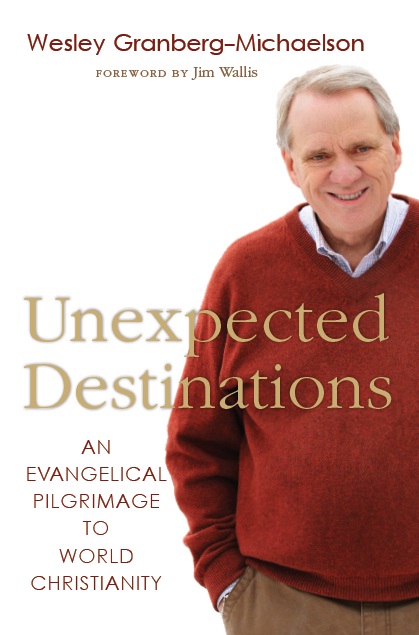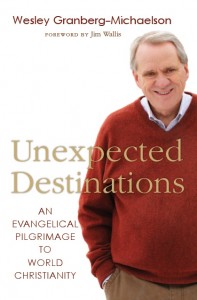Unexpected Destinations III: A Conversation with Wes Granberg-Michaelson
Read the first part of this interview
Read the second part of this interview
Read the fourth part of this interview
Read the fifth part of this interview
This week on ecclesio, we discuss issues raised in Wes Granberg-Michaelson’s book Unexpected Destinations: An Evangelical Pilgrimage into World Christianity (Eerdmans, 2011). Today, we discuss the seismic shifts in the global church over recent decades, as the church in the global south has gained prominence.
CHR: I’d like to talk about the relationship of North and South in the church, the global north and the global south. Wes, you and I were together in Grand Rapids for a meeting, the first meeting of the World Communion of Reformed Churches. At that meeting, Wes, you suggested that the headquarters of the organization should be moved to Johannesburg from Geneva. And I have watched over the last year and a half, and that organization is struggling financially to the extent that one of the two program executives is not being moved to work in Geneva because there isn’t money to move her. Yet, she is the staffperson from the global south who, in my own view, has a perspective that is lacking currently in the Geneva office, a perspective that is needed for the organization to go forward faithfully.
Wes, you spoke much about the relationship of north and south in your book and spoke to that from the perspective of a number of positions you have held. In our work, how do we address the reality that the energy of the church has moved south, from Philip Jenkins’ End of Christendom on down? How do we deal with this? What is the future like? What is the impact of racism in how we are addressing this? How do we work with power relations internationally, and the relationship of poor and rich, north and south, light and dark skin, that continues to impact our work in the church?
WGM: You have touched on the primary issue that is affecting the church today. The church in North America in all its forms, we are all insufficiently attuned to what has occurred in the global church. The Church has moved to the global south, and that is decisively shaping the face and witness of the Christian Church in the world. It will be only when the church in the north can understand this and figure out how to build bridges that make a coherent and unified witness, will we have a chance.
We all talk about interfaith relationships, as we should. I do not believe that the Christian church will have a chance to make interfaith relationships that matter and transform until we can effectively address the gaps in our own life as Christians in the world.
There are two stories shaping Christianity. One is Africa – in one century, the figures move from 8 to 10 million Christians, to 350 – 360 million Christians, heading quickly toward 500 million Christians on the continent. The other story is Pentecostalism, starting with Azusa Street, a racially diverse, generally lower income group having an experience in Los Angeles a hundred years ago, to the point today where 1 out of every four Christians in the world is Pentecostal. These changes have been enormous, and we tend to look at these developments through our Northern eyes. But the more you examine the expressions of the church which are indigenously rooted in Latin America, and Africa, and Asia, rather than products of the North American and European missionary enterprise there, you find a church that is far more holistic, and creative, and energized, and is shaping the future.
There are problems – number one, these movements rarely have a sense of the wider Christian tradition. And two, these churches are often very sectarian and they are often cut off from the tradition of the church. You can see some going off in bizarre theological directions. The churches of the North carry the tradition of the church, and carry the sense of the church being one, the catholicity of the church. But they lack the energy that is present in the church in the south. So building bridges is necessary between the two. This is problematic for the ecumenical and international church organizations, many of them, because they don’t have the necessary scope of relationships to make bridge-building possible. So that’s why, for instance, the Global Christian Forum is one of the most hopeful things to me, which brings together the full scope of those voices. But ultimately, what’s happening in the global south is what is shaping Christianity – and if we don’t relate to that we won’t be useful to God’s mission.
Dick Hamm (DH): There’s two other points. The south has come to the north in many ways with immigrant communities that are burgeoning, and every denomination I know of is trying to make new congregations of these immigrant people. Denominational leaders know that these new immigrants hold knowledge that is needed in the north.
The other point is the area of overseas ministries, which used to be done pretty colonially, has moved to be done more in partnership. But as the northern churches shrink, overseas ministries is more about transformation of the church in the north. We do have resources, of course, and we should share these. But the focus has changed and now there are two in overseas ministries – what we can give and what we can get. So, I think overseas ministries programs need to get North American Christians to the south to see the south in ways that are not damaging to the south, so that they can learn and bring news of the riches of the church in the south.
Adam Phillips (AP): There’s been a great Pew Forum on Religion and Public Life survey that came out in December. They researched over 200 countries, and showed that 1/3 of the people in the world identify as Christian, and there is no geographical center for that except that it is in the south. So that data proves that reality. So we need to rethink our ways of doing mission, development work, poverty assistance – fighting malaria, fighting AIDS, getting clean water to people – and finding ways that we can partner together, in international trade policy, and how we set up our economies, and how we can work together to be advocates for economic systems that serve people rather than harm people. The church has been a bit reactionary about this and we need to look at what we can learn from our brothers and sisters in the south.
The other issue is interfaith relationships, and that too has moved to the south. There have been some awful stories about the violence in relationships between Christians and Muslims, and there are also some wonderful stories of dialogue and relationships in Africa, like in Sierra Leone, which is 50% Christian, 50% Muslim. They are really doing some great things to combat malaria, and work to address joblessness, and toward development. What can we learn from them about how to work in constructive directions in interfaith ways? Looking for the positive stories from the south that can help us move forward in the vast diversity present in the faith community would be a sign of progress.



Pingback: christianoutreachnow.com - Unexpected Destinations III: A Conversation with Wes Granberg …